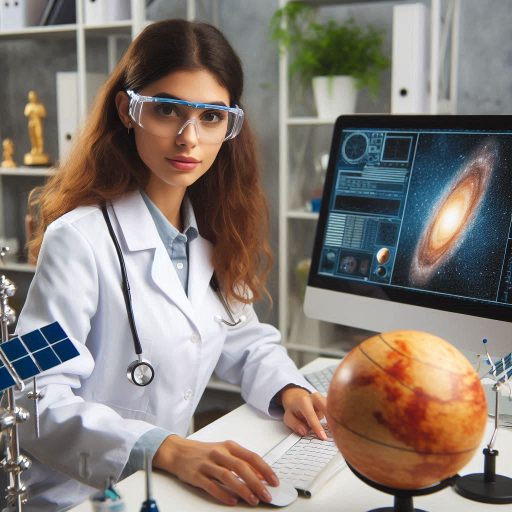Introduction
A career in space science offers exciting opportunities and unique challenges as space science career challenges and rewards.
This field attracts individuals passionate about exploring the universe and advancing human knowledge.
With recent breakthroughs and missions, interest in space exploration has surged.
Companies like SpaceX and NASA have inspired many to pursue careers in this dynamic industry.
The increasing focus on Mars exploration and lunar missions fuels public curiosity and engagement.
Young people are drawn to the idea of becoming astronauts, engineers, and scientists.
Educational programs in schools and universities emphasize STEM subjects, fostering a new generation of space enthusiasts.
This blog post aims to explore the challenges and rewards of a space science career.
Individuals in this field often face rigorous training, demanding work environments, and the pressure of meeting high expectations.
However, they also experience incredible rewards, such as contributing to groundbreaking discoveries and participating in historic missions.
Understanding both aspects helps aspiring space scientists prepare for their journeys.
By recognizing potential obstacles, individuals can develop resilience and adaptability.
The blog will provide insights into what it takes to succeed in this thrilling field, emphasizing the importance of passion, dedication, and teamwork.
Challenges of a Space Science Career
The Rigorous Educational Requirements
A career in space science demands rigorous educational qualifications.
Most positions require at least a bachelor‘s degree in a related field.
Common degrees include astrophysics, astronomy, planetary science, or aerospace engineering.
Many professionals pursue advanced degrees to enhance their expertise and career prospects.
Master‘s and Ph.D. programs allow students to specialize in specific areas of research.
Completing these degrees involves extensive coursework and research projects.
Students learn complex mathematical concepts, physics principles, and technical skills.
They also participate in internships or research assistantships to gain practical experience.
These opportunities provide hands-on training, making graduates more competitive in the job market.
Educational programs often include collaboration with institutions like NASA or private space companies.
Students engage in research projects that contribute to ongoing space missions.
This experience helps them build essential skills while making valuable industry connections.
The Competitive Nature of the Field
The field of space science is highly competitive.
Many qualified candidates vie for limited job openings in academia and industry.
Research positions often attract numerous applicants, making it challenging to stand out.
Graduates need to showcase their unique skills and experiences to increase their chances of employment.
Networking plays a crucial role in overcoming competition.
Building relationships with professionals in the field can lead to job opportunities.
Attending conferences and participating in workshops allows candidates to connect with potential employers.
Joining professional organizations also provides access to resources and job listings.
The competitive nature of the field can lead to pressure and stress.
Aspiring space scientists must be persistent and adaptable to succeed.
Those who can navigate this competitive landscape are often rewarded with fulfilling careers.
The Physical and Mental Demands of Working in Space
Working in space science can be physically and mentally demanding.
For astronauts, rigorous physical training is essential for space missions.
They must maintain peak physical condition to handle the stresses of launch and microgravity environments.
Even for scientists working on Earth, mental resilience is crucial.
Space science involves long hours, intense problem-solving, and critical thinking.
Researchers often face complex challenges that require innovative solutions.
They must be prepared to adapt to unforeseen issues, especially during active missions.
Isolation can also be a challenge for those working in remote locations.
Space missions require long periods away from family and friends.
Astronauts experience confinement and limited social interactions while in space.
Researchers involved in fieldwork may also spend extended periods in isolated environments.
Despite these challenges, many professionals find great rewards in their careers.
Contributing to groundbreaking discoveries and advancing our understanding of the universe is fulfilling.
The opportunity to work with cutting-edge technology and collaborate with brilliant minds is exciting.
Ultimately, the challenges faced in space science can lead to rewarding experiences and a profound sense of accomplishment.
A career in space science offers unique challenges and rewards.
The rigorous educational requirements, competitive nature of the field, and physical and mental demands shape professionals in this field.
Those who persevere and adapt to these challenges often find immense satisfaction in their contributions to space exploration and research.
Rewarding Opportunities in Space Science
Various Career Paths Available in Space Science
A career in space science offers diverse opportunities across multiple fields.
Professionals can work in research, engineering, education, or policy.
Positions in research involve studying celestial bodies, astrobiology, and planetary science.
Space scientists often work at institutions like NASA, ESA, and private space companies.
Engineers play a critical role in developing spacecraft, instruments, and technologies.
Aerospace engineers design and test vehicles for space travel.
Mechanical engineers focus on spacecraft systems and structural integrity.
Software engineers develop the software that controls missions and processes data.
Educational roles in space science involve teaching and outreach.
Many professionals work at universities or research institutions, sharing knowledge with students.
They may also participate in public outreach programs to promote interest in space science.
Policy roles address the implications of space exploration.
These positions involve developing regulations and guidelines for space activities.
Professionals in this area work with governments, organizations, and international agencies to shape space policy.
The Potential for Groundbreaking Discoveries
The field of space science holds immense potential for groundbreaking discoveries.
Researchers continually explore the universe, revealing new knowledge about our solar system and beyond.
For instance, missions to Mars have uncovered evidence of past water, suggesting the possibility of life.
Space telescopes like Hubble and James Webb have revolutionized our understanding of distant galaxies.
They provide insights into the formation of stars, planets, and the universe itself.
These discoveries can change our perception of space and our place within it.
Moreover, studying asteroids and comets can reveal the origins of our solar system.
Understanding these celestial objects helps scientists learn about Earth’s history.
This knowledge can inform future exploration and resource utilization strategies.
As technology advances, the potential for new discoveries increases.
Innovations in robotics and artificial intelligence improve our ability to explore space.
These advancements enable scientists to analyze data more efficiently and conduct remote investigations.
The Impact of Space Science on Society
Space science profoundly impacts society in numerous ways.
It drives technological advancements that benefit everyday life.
For example, satellite technology has revolutionized communication, weather forecasting, and navigation.
Moreover, space science inspires curiosity and innovation.
It encourages students to pursue careers in STEM fields, fostering a new generation of scientists and engineers.
By sparking interest in science, space exploration helps create a more scientifically literate society.
The environmental impact of space science is also significant.
Satellite data plays a crucial role in monitoring climate change and natural disasters.
This information aids in disaster response and informs policy decisions regarding environmental protection.
Additionally, international collaboration in space science fosters global partnerships.
Countries work together on missions, sharing knowledge and resources.
This cooperation promotes peace and understanding among nations.
A career in space science offers diverse paths and significant rewards.
The potential for groundbreaking discoveries continues to drive interest and innovation in the field.
Furthermore, space science impacts society by advancing technology, inspiring future generations, and addressing global challenges.
As we explore the cosmos, we gain valuable insights that benefit humanity and enhance our understanding of the universe.
Read: Interdisciplinary Research: Botany and Other Sciences
Importance of Networking in Space Science Careers
The Significance of Networking in the Field
Networking plays a crucial role in building a successful space science career.
Strong professional connections open doors to new opportunities.
In a rapidly evolving field like space science, collaboration is essential for innovation.
Networking helps you stay informed about industry trends and job openings.
Many space science projects require multidisciplinary teams.
By networking, you can connect with experts from various backgrounds.
This diversity fosters creative solutions to complex problems.
Additionally, networking can lead to mentorship opportunities, providing valuable guidance and support.
Industry conferences, workshops, and seminars offer excellent networking opportunities.
Engaging with peers and established professionals helps you gain insights into their experiences.
Building relationships in the space science community enhances your professional reputation.
Tips for Building a Strong Professional Network
Building a strong professional network requires intentional effort and strategy.
Start by attending industry events, such as conferences and symposiums.
Participate in discussions and ask questions to engage with speakers and attendees.
Utilize online platforms like LinkedIn to connect with professionals in space science.
Join relevant groups and engage in discussions to showcase your knowledge.
Share articles, insights, and updates to increase your visibility in the field.
Don‘t hesitate to reach out to professionals for informational interviews.
Politely request a brief chat to learn about their experiences.
Most professionals appreciate the opportunity to share their knowledge with others.
Volunteer for projects or organizations related to space science.
Contributing your skills to meaningful initiatives helps you meet like-minded individuals.
These connections often lead to lasting professional relationships.
Consider joining professional organizations, such as the American Astronomical Society or the International Astronautical Federation.
These organizations provide networking opportunities, resources, and access to industry experts.
The Benefits of Networking for Career Advancement
Networking offers numerous benefits that can significantly enhance your career in space science.
Strong connections can lead to job referrals, increasing your chances of landing positions.
Many job openings are filled through personal recommendations rather than public postings.
Networking also provides access to valuable resources, including mentorship and professional development opportunities.
Experienced professionals can offer guidance on career paths, skill development, and industry trends.
Their insights can help you navigate challenges and make informed decisions.
Additionally, networking can expose you to innovative ideas and collaborative projects.
Engaging with diverse perspectives fosters creativity and enhances problem-solving skills.
This collaborative spirit is essential for addressing the complex challenges of space science.
Furthermore, networking can increase your visibility in the field.
By building a reputation as an engaged and knowledgeable professional, you can attract more opportunities.
Industry peers may reach out to you for collaborations or speaking engagements.
Networking is essential for success in a space science career.
Building a strong professional network requires strategic efforts and active participation.
The benefits of networking extend beyond job opportunities, fostering collaboration, mentorship, and professional growth.
By prioritizing networking, you can enhance your career and contribute to the advancement of space science.
Read: Women in Botany: Celebrating Pioneers and Leaders
Balancing Work and Personal Life in a Space Science Career
Challenges of Maintaining a Work-Life Balance in a Demanding Field
A career in space science can be both rewarding and demanding.
Many professionals face challenges in maintaining a work-life balance.
The pressure to meet project deadlines can often extend work hours.
Researchers and scientists frequently find themselves working late nights and weekends.
This intense workload can strain personal relationships and lead to burnout.
Fieldwork can also disrupt routine schedules.
Traveling for research or attending conferences often requires time away from home.
This can add further stress to already busy lives.
Additionally, the competitive nature of the field may encourage long hours, making it difficult to prioritize personal well-being.
Strategies for Managing Stress and Avoiding Burnout
Managing stress is crucial for anyone in the space science field.
Developing effective time management skills is a vital first step.
Prioritizing tasks can help professionals focus on what matters most.
Creating to-do lists or using project management tools can enhance productivity.
Setting clear boundaries between work and personal life is essential.
Professionals should establish specific work hours and stick to them.
Communicating these boundaries with colleagues can foster a healthier work environment.
Taking regular breaks throughout the day can also recharge energy levels and improve focus.
Practicing mindfulness and relaxation techniques can significantly reduce stress.
Techniques such as meditation or deep-breathing exercises can help calm the mind.
Engaging in physical activities, like running or yoga, can also alleviate stress.
Regular exercise releases endorphins, which boost mood and energy.
Importance of Self-Care for Long-Term Career Success
Self-care is vital for sustaining a successful career in space science.
Prioritizing physical and mental health allows professionals to perform at their best.
Engaging in hobbies outside of work can provide a necessary break from the demands of the field.
Whether it‘s painting, hiking, or reading, these activities rejuvenate the spirit.
Building a strong support network is also crucial.
Friends, family, and colleagues can offer emotional support during tough times.
Sharing experiences and discussing challenges can foster resilience and help overcome difficulties.
Networking with others in the field can create opportunities for collaboration and mutual support.
Maintaining a healthy lifestyle significantly impacts career longevity.
A balanced diet, regular exercise, and adequate sleep enhance overall well-being.
Staying hydrated and consuming nutritious foods can improve concentration and energy levels.
Finally, seeking professional help when needed should not be overlooked.
Therapy or counseling can provide valuable tools for managing stress and addressing challenges.
Many organizations offer mental health resources, which can be beneficial.
A career in space science presents unique challenges and rewards.
Maintaining a work-life balance is essential for long-term success.
Implementing strategies to manage stress and prioritizing self-care can lead to a fulfilling and sustainable career.
By addressing these challenges proactively, professionals can thrive in the dynamic field of space science.
Read: How Climate Change Is Impacting Plant Research

Overcoming Gender and Diversity Challenges in Space Science
The Lack of Diversity in the Space Science Industry
The space science industry faces significant diversity challenges.
Historically, it has lacked representation from various demographic groups.
This lack of diversity limits perspectives and ideas in research and innovation.
Many people of color and women remain underrepresented in science, technology, engineering, and mathematics (STEM) fields.
The disparity is especially noticeable in leadership roles and decision-making positions.
Addressing these challenges is crucial for the industry‘s growth and progress.
Studies show that diverse teams produce better outcomes.
Diverse backgrounds foster creativity and enhance problem-solving abilities.
The lack of diversity can hinder scientific advancements and miss out on valuable insights.
To create an equitable industry, stakeholders must prioritize diversity and inclusion.
Initiatives to Promote Diversity and Inclusion in the Field
Several initiatives aim to improve diversity within space science.
Organizations are increasingly recognizing the need for targeted programs.
Many universities now offer scholarships and mentorship programs for underrepresented groups in STEM.
These initiatives provide financial support and guidance for aspiring space scientists.
Professional organizations like NASA and the American Astronautical Society implement diversity initiatives.
These programs focus on outreach to underrepresented communities.
They seek to inspire the next generation of scientists and engineers through education and exposure.
Internship and fellowship programs are also being developed specifically for diverse candidates.
These opportunities provide hands-on experience in the field, enhancing skills and confidence.
By targeting underrepresented groups, these initiatives aim to create a more inclusive workforce.
Moreover, industry leaders are advocating for inclusive hiring practices.
Companies are working to eliminate bias in recruitment and selection processes.
This shift is vital for creating a more equitable space science workforce.
Importance of Fostering a Diverse and Inclusive Workplace
Fostering a diverse and inclusive workplace is essential for the future of space science.
Diverse teams bring unique perspectives that enhance innovation and creativity.
This diversity drives scientific advancements and leads to groundbreaking discoveries.
An inclusive environment also improves employee satisfaction and retention.
When individuals feel valued and respected, they are more likely to thrive.
A diverse workforce encourages collaboration and open communication, benefiting everyone involved.
Moreover, fostering diversity attracts talent from a broader range of backgrounds.
This influx of ideas and perspectives strengthens the entire industry.
The space science field can solve complex problems more effectively with diverse teams.
Creating a culture of inclusion requires commitment from all levels of an organization.
Leaders must actively promote diversity initiatives and hold teams accountable.
Organizations should regularly assess their diversity and inclusion efforts to identify areas for improvement.
The challenges of diversity in the space science industry must be addressed to create a more equitable field.
Initiatives promoting diversity and inclusion are essential for attracting and retaining talent.
A diverse and inclusive workplace fosters innovation, creativity, and satisfaction among employees.
By prioritizing diversity, the space science industry can thrive and make groundbreaking advancements that benefit everyone.
Read: Exploring the Different Branches of Geology
Transform Your Career Today
Unlock a personalized career strategy that drives real results. Get tailored advice and a roadmap designed just for you.
Start NowDiscover More: Bioinformatics in Agriculture: Applications and Impact
Advancements in Space Technology and Their Impact on Careers
The Latest Advancements in Space Technology
The field of space science continuously evolves with new advancements in technology.
Recent innovations include reusable rockets, satellite miniaturization, and advanced robotics.
Companies like SpaceX and Blue Origin lead in developing reusable launch systems.
This technology dramatically reduces costs and increases access to space.
Moreover, satellite technology has improved significantly.
Smaller, more efficient satellites can gather data and communicate more effectively.
This shift enhances our understanding of Earth and space phenomena.
Innovations in remote sensing allow scientists to monitor climate change and natural disasters more accurately.
Artificial intelligence (AI) also plays a crucial role in space exploration.
AI helps analyze large datasets generated by space missions.
Machine learning algorithms can identify patterns that humans might miss.
This capability streamlines research and enhances our ability to make informed decisions.
How Emerging Technologies Are Shaping the Future of Space Science Careers
Emerging technologies significantly shape the future of space science careers.
As new tools and methodologies develop, professionals must adapt and learn.
Knowledge of programming, data analysis, and engineering will be essential for future scientists.
Additionally, interdisciplinary collaboration is becoming increasingly important.
Professionals will need to work alongside engineers, computer scientists, and data analysts.
This collaboration fosters innovation and drives progress in space exploration.
Remote work and virtual collaboration tools also impact career dynamics.
Professionals can now work with teams worldwide, enhancing project diversity.
This shift opens up new opportunities for international collaboration and knowledge sharing.
As technology continues to advance, the demand for skilled professionals grows.
Fields like astrobiology, planetary science, and aerospace engineering require experts.
Aspiring scientists should focus on building relevant skills to stay competitive.
The Potential Opportunities for Career Growth in the Field
Career growth opportunities in space science are expanding rapidly.
The increased interest in space exploration fuels demand for qualified professionals.
Both governmental and private organizations actively seek skilled workers.
Job roles in space science include researchers, engineers, and data analysts.
These positions offer diverse career paths, from academia to industry.
Professionals can specialize in areas like satellite technology, planetary studies, or space policy.
Internships and entry-level positions often lead to advanced roles.
Many organizations provide mentoring programs to help new employees grow.
Networking through professional organizations can also open doors to new opportunities.
Emerging fields like space tourism and asteroid mining offer exciting prospects.
As these industries grow, they will require various expertise.
Professionals with diverse skills will be well-positioned to capitalize on these trends.
Moreover, public interest in space exploration continues to rise.
This interest increases funding for research and education programs.
Increased investment in space science creates additional job opportunities for emerging professionals.
In addition, a career in space science presents both challenges and rewards.
As technology advances, professionals must adapt and grow.
The potential for career growth in this dynamic field is vast.
By embracing innovation and collaboration, aspiring scientists can thrive in the exciting world of space science.
Professional Development Resources for Space Scientists
Online Resources for Professional Development
In a rapidly evolving field like space science, professional development is crucial.
Numerous online resources can help you stay informed and enhance your skills.
Websites such as Coursera and edX offer courses from top universities on space science topics.
These platforms provide flexible learning options to fit your schedule.
NASA‘s website features educational resources and webinars for professionals.
They cover a range of topics, including spacecraft design and astrophysics.
Engaging with these resources can deepen your understanding and improve your expertise.
Professional organizations like the American Astronomical Society (AAS) provide valuable resources.
They offer access to journals, conferences, and networking opportunities.
Joining such organizations can connect you with experts in the field.
LinkedIn Learning also offers numerous courses related to space science and technology.
These courses focus on skills such as data analysis and programming.
Completing these courses can enhance your qualifications and make you more competitive in the job market.
The Importance of Continuing Education
Continuing education is essential for success in space science careers.
The field evolves rapidly, with new technologies and discoveries emerging frequently.
Staying updated on the latest developments helps professionals remain relevant and effective.
Graduate programs often require ongoing education to maintain credentials.
Many fields, including aerospace engineering and astrophysics, mandate continuing education.
This requirement ensures professionals stay informed about industry standards and practices.
Participating in workshops and conferences enhances your knowledge base.
These events provide insights into current research and advancements.
Attending talks by industry leaders can inspire new ideas and approaches in your work.
Moreover, continuing education fosters adaptability.
As technologies change, professionals must learn new tools and methodologies.
Ongoing education helps you embrace innovation and tackle emerging challenges effectively.
Benefits of Staying Updated on Industry Trends
Staying updated on industry trends offers numerous benefits.
First, it enhances your professional reputation.
Colleagues and employers appreciate individuals who demonstrate knowledge of recent advancements.
This awareness positions you as a valuable asset to your team.
Additionally, staying informed opens up new opportunities.
Many companies seek employees who understand current trends and technologies.
Knowledge of advancements can lead to promotions and new job offers in your field.
Networking also benefits from your awareness of industry trends.
Engaging in discussions about recent developments can spark valuable conversations.
These interactions may lead to collaborations and mentorship opportunities.
Furthermore, understanding trends allows for proactive career planning.
You can identify emerging areas of interest and pursue relevant training.
This foresight helps you align your skills with future demands in the field.
In closing, a career in space science presents both challenges and rewards.
Utilizing online resources for professional development is crucial for staying competitive.
Continuing education is essential in a rapidly evolving field like space science.
Staying updated on industry trends enhances your professional reputation and opens doors to new opportunities.
By prioritizing ongoing education and staying informed, you can thrive in your space science career.
Conclusion
A career in space science presents both challenges and rewards.
The field demands rigorous education and training, often requiring advanced degrees in science or engineering.
Job competition can be intense, and funding for research projects may fluctuate.
These challenges can discourage some aspiring scientists.
However, the rewards of a space science career are immense.
Working in this field offers opportunities to explore the universe and make groundbreaking discoveries.
Space scientists often contribute to significant projects, such as satellite missions and planetary exploration.
Their work impacts various industries, from telecommunications to environmental monitoring.
Pursuing a career in space science is important, despite the challenges.
The need for skilled scientists and engineers continues to grow as we advance our exploration efforts.
By facing the difficulties head-on, you can help push the boundaries of human knowledge.
Consider the unique opportunities that await you in this dynamic field.
Collaborating with brilliant minds and solving complex problems can be incredibly fulfilling.
As you contribute to our understanding of space, you‘ll inspire future generations to dream big.
The challenges may be daunting, but the potential for discovery and innovation in space science is truly rewarding.
[E-Books for Sale]
The Big Book of 500 High-Paying Jobs in America: Unlock Your Earning Potential
$19.99 • 500 High-Paying Jobs • 330 pages
Explore 500 high-paying jobs in America and learn how to boost your career, earn more, and achieve success!
See All 500 High-Paying Jobs of this E-Book
1001 Professions Without a Degree: High-Paying American Jobs You Can Start Now
$19.99 • 1001 Professions Without a Degree • 174 pages
Discover 1001 high-paying jobs without a degree! Unlock career tips, skills, and success strategies for just $19.99!




